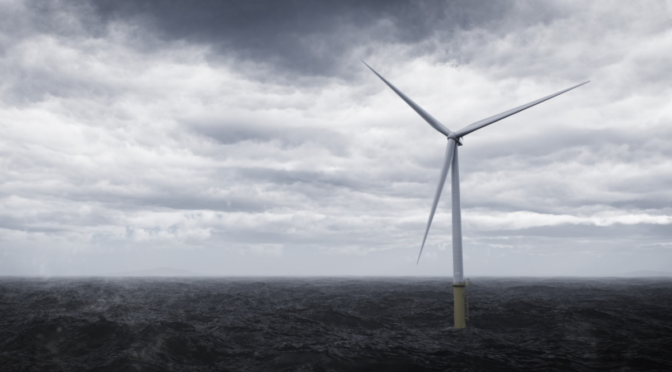The offshore wind farm will have 476 MW installed capacity. Pioneering V174-9.5 MW from MHI Vestas wind turbine to be used, allowing sharp cut in cost of electricity. The two companies will work together on exclusivity terms until the final supply contract is signed. Germany is one of Iberdrola’s strategic markets for offshore wind energy development and, when Baltic Eagle is commissioned, the company’s total capacity in the country will exceed 830 MW, with cumulative investment of €2.5 billion
Berlin. Iberdrola has selected MHI Vestas Offshore Wind as preferred turbine supplier for its 476-megawatt (MW) Baltic Eagle offshore wind farm on an area of 40 km2 being developed in German waters of the Baltic Sea, off the island of Rügen. The contract will include up to 52 units of the V174-9.5 MW offshore wind turbine, the newly released version of the game-changing 9 MW platform from MHI Vestas.
With this decision Iberdrola builds up on its commitment to the project’s development after the launch of the main geotechnical campaign back in the summer of 2018. All necessary design and contracting activities for main components are also progressing according to the project programme.
The director of Iberdrola’s Renewables Business, Xabier Viteri, stressed that Baltic Eagle “confirms the company’s firm commitment to use technological innovation to delivering utility-scale renewable projects which combat climate change and foster economic and social development in the territories where we operate.”
“We are extremely proud to launch our V174-9.5 MW turbine with the Baltic Eagle project,” said MHI Vestas CEO, Philippe Kavafyan. “This will be a tremendous opportunity for MHI Vestas to deepen our experience in German waters and notably in the Baltic Sea. We look forward to confirming the order with Iberdrola and readying for installation.”
Baltic Eagle is the second major offshore initiative undertaken by the company in Germany, one of its key strategic markets, following the successful connection to the grid of the 350-MW Wikinger wind farm at the end of 2017.
Together with Wikinger and Wikinger Süd, it will give rise to the largest offshore wind complex in the Baltic Sea, with a total installed capacity of 836 MW and a joint investment of 2.5 billion euros. The complex will be able to produce enough energy to meet 45% of the total electricity consumption of the state of Mecklenburg-West Pomerania and it will displace the emission of 1.65 million tons of CO2 per year, thus contributing to meeting Germany’s emission reduction targets.
The whole complex will be operated through Mukran port on the island of Rügen. Baltic Eagle is around 75km off the coast and will also be connected to station Lubmin through 2 new HV cables by 50Hertz.
Bringing down the cost of offshore wind power technology
Iberdrola is delivering a large cut in the cost of offshore wind power through Baltic Eagle, after a successful bid in the second offshore tender organised by Germany’s Federal Network Agency (Bundesnetzagentur). This has been made possible by Iberdrola’s use of advanced technology, such as larger and more efficient wind turbines.
In this sense, Iberdrola continues to build its relationship with MHI Vestas. This is the second preferred turbine supplier agreement signed by the two companies, after having signed a similar agreement for the 800-megawatt (MW) Vineyard Wind facility in the United States.
The deal foresees delivery and installation of the WTGs in 2022 / 2023.
Iberdrola offshore wind energy business
With a strong and extensive pipeline of over 9 GW and nearly 3 GW in operation, under construction or with secured long-term contracts, offshore wind power has consolidated as a core business for Iberdrola, key to the company’s future growth which is based on operational excellence and efficiency. Large investments are planned up to 2022 mainly in the United Kingdom, United States, Germany and France.
The Group already operates the 389-MW West of Duddon Sands (WoDS) offshore wind farm in the Irish Sea (since 2014) and 350-MW Wikinger in the German Baltic Sea (since 2017) and is installing the 714-MW East Anglia One offshore wind farm in British waters in the North Sea. At different stages of planning and development are 496-MW Saint-Brieuc project, off the coast of Brittany in northern France, which will use sixty-two Siemens-Gamesa turbines each with 8-MW unit capacity; 800-MW Vineyard Wind, a joint venture with Copenhagen Infrastructure Partners, off the coast of Massachusetts; and Baltic Eagle.
Iberdrola is a global energy leader, the main wind power producer and one of the world’s largest electric utilities by market capitalization. The group operates in many countries and supplies power to nearly 100 million people, mainly in Spain, the United Kingdom (ScottishPower), the United States (AVANGRID), Brazil (Neoenergia) and Mexico. With a workforce of 34,000 people and assets worth €110 billion, it filed a turnover of €31.2 billion and a net profit of €2.8 billion in 2017.
Iberdrola leads the energy transition towards a sustainable model through investments in renewable energy, smart grids, large-scale energy storage and digital transformation, offering the most advanced products and services to its customers. Thanks to its commitment to clean energy, it is one of the companies with the lowest emissions and an international benchmark for its contribution to the fight against climate change and the sustainability of the planet, all of which have placed the group in prominent positions on indexes such as the Dow Jones Sustainability Index and FTSE4Good. Iberdrola is considered as one of the world’s most sustainable electricity companies.
MHI Vestas Offshore Wind is a joint venture between Vestas Wind Systems A/S 50% and Mitsubishi Heavy Industries (MHI) 50%. The company’s focus is to design, manufacture, install and service wind turbines for the offshore wind industry. The company aims to create sustainable value through offshore wind power by driving capital and operating savings and increasing the power output of wind turbines. An innovative force in offshore wind since its inception in 2014, the company is guided by its founding principles of collaboration, trust, technology and commitment.


